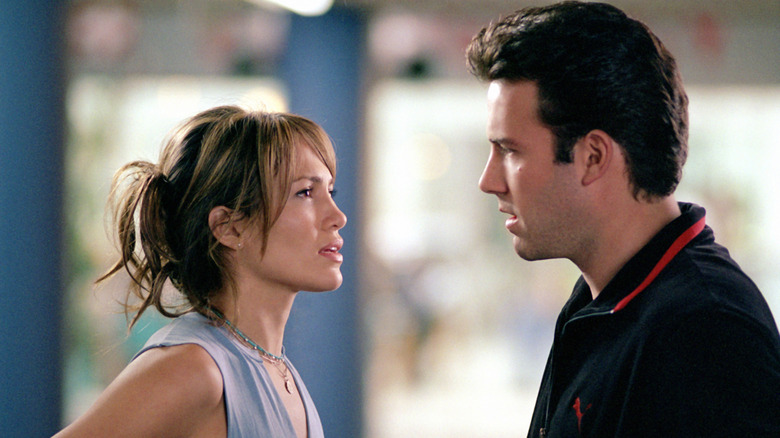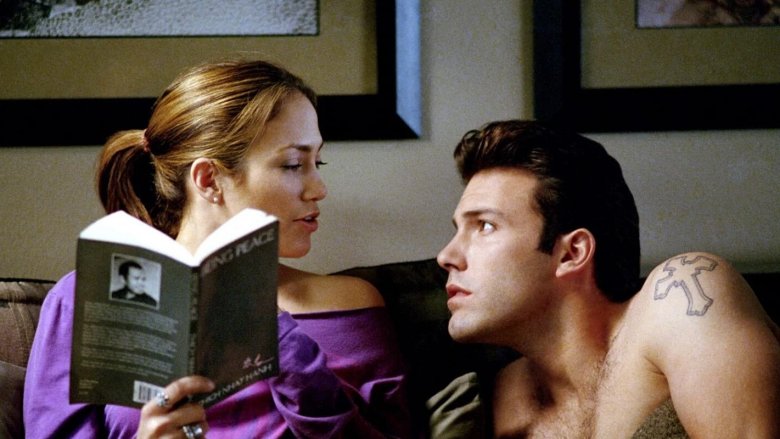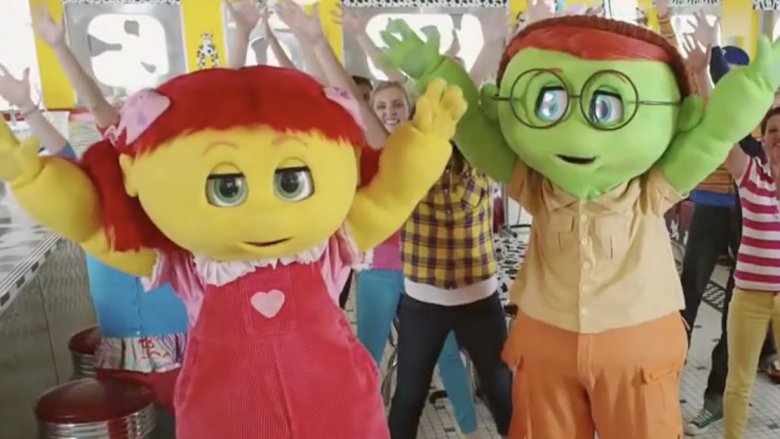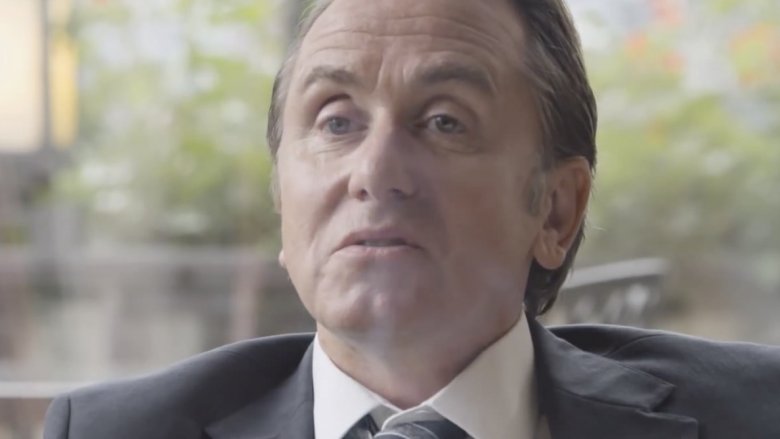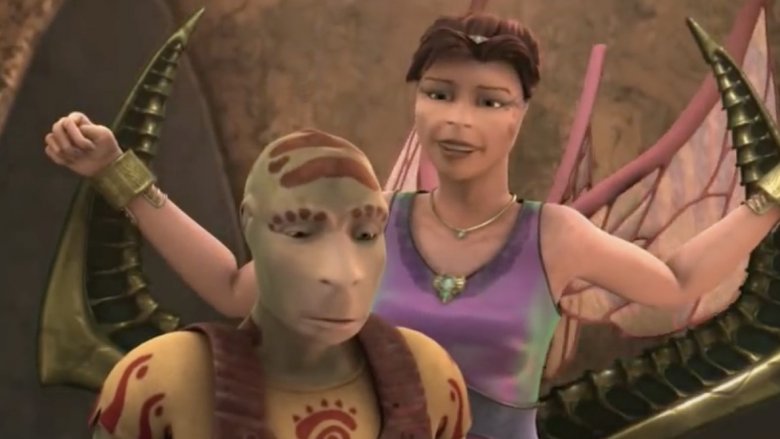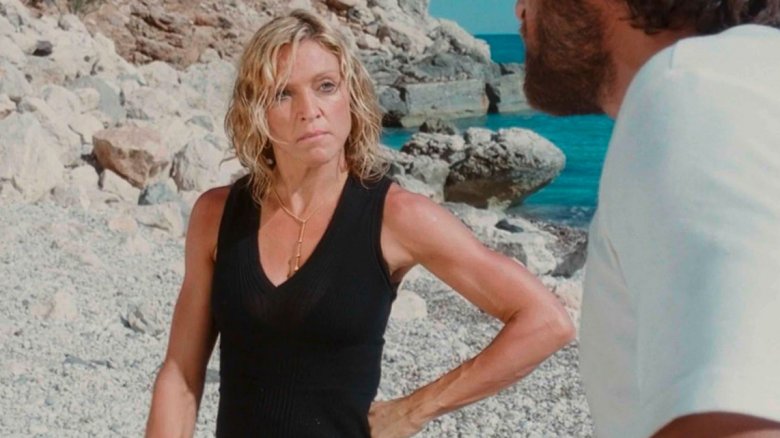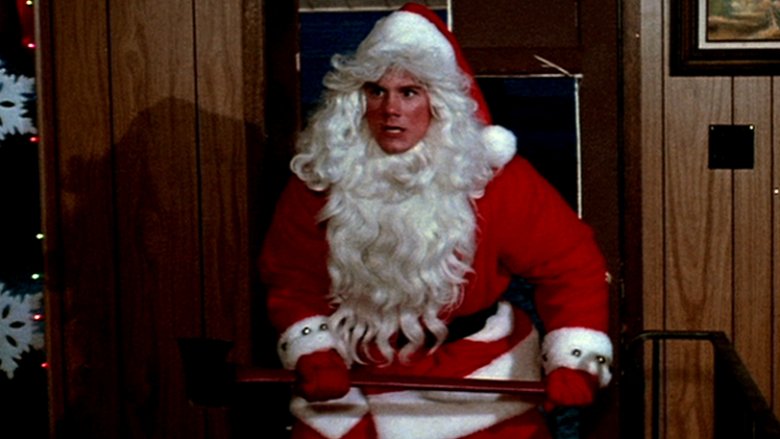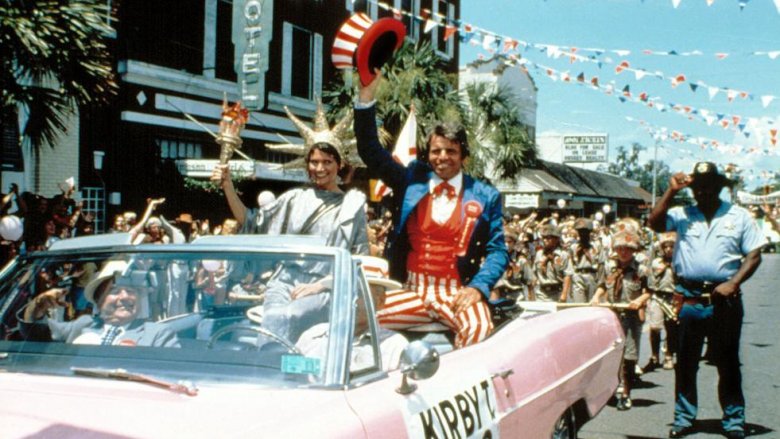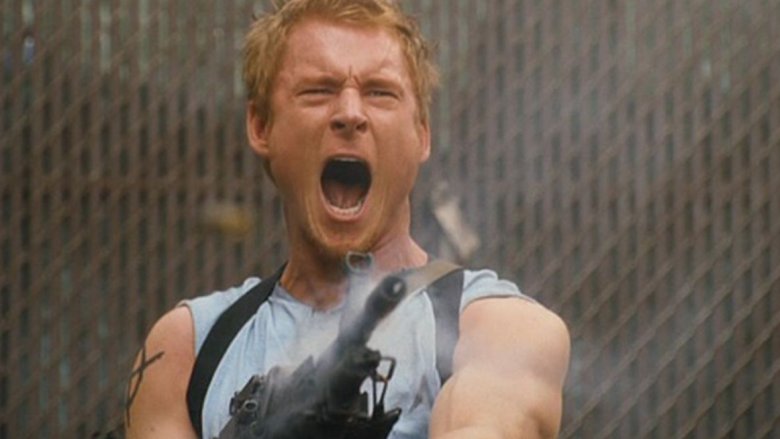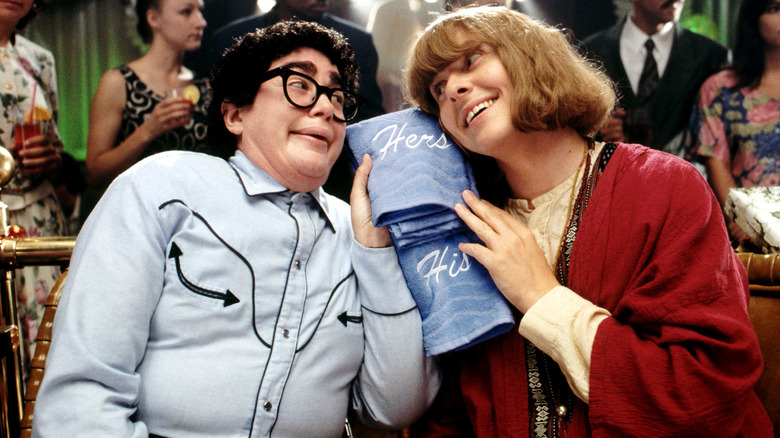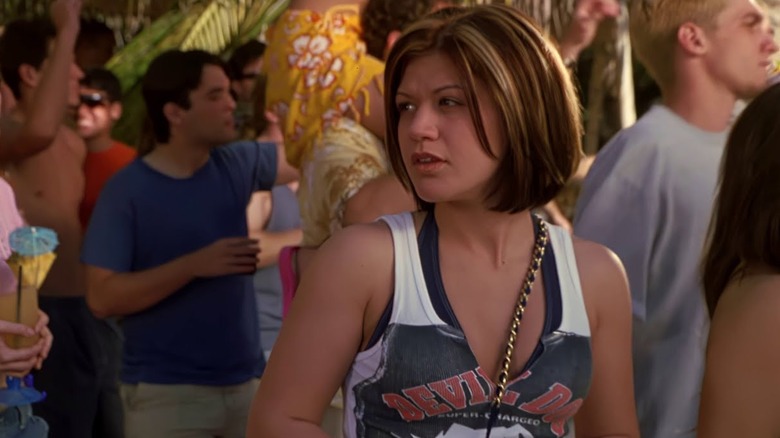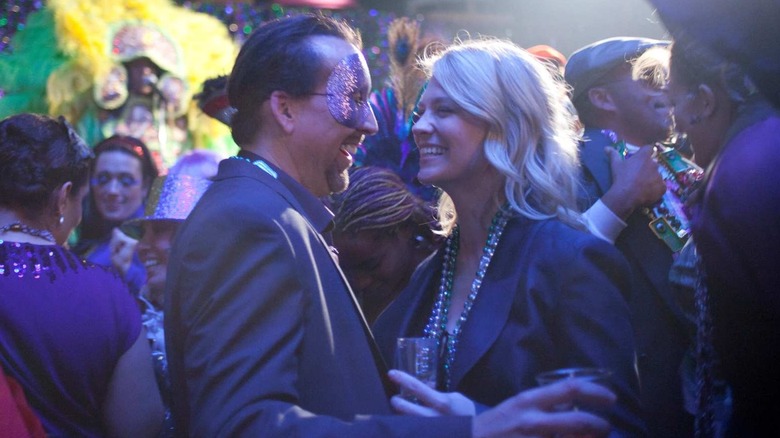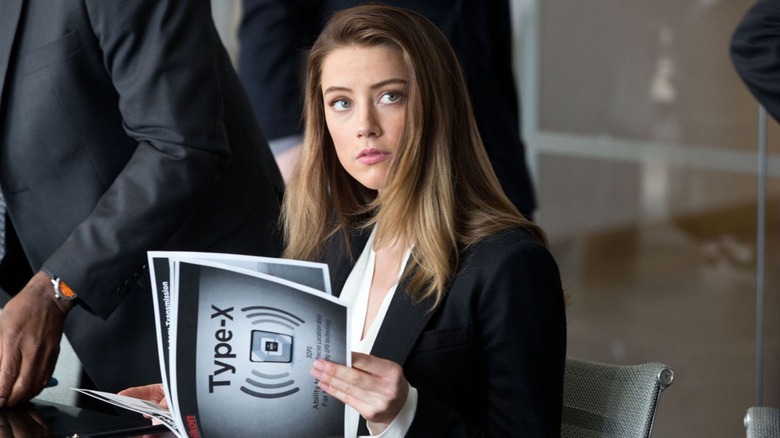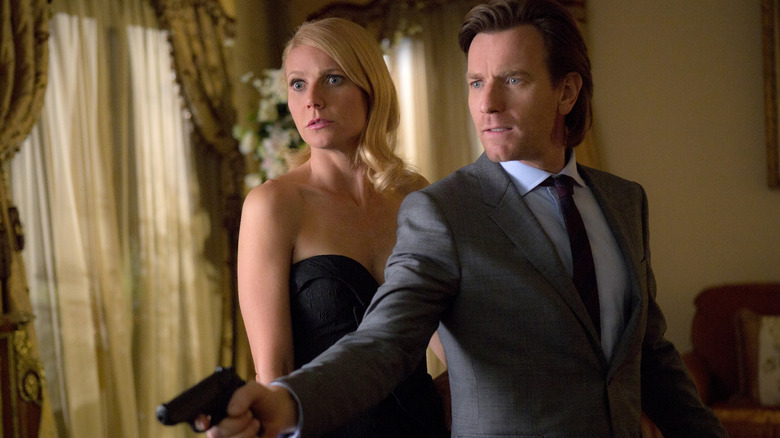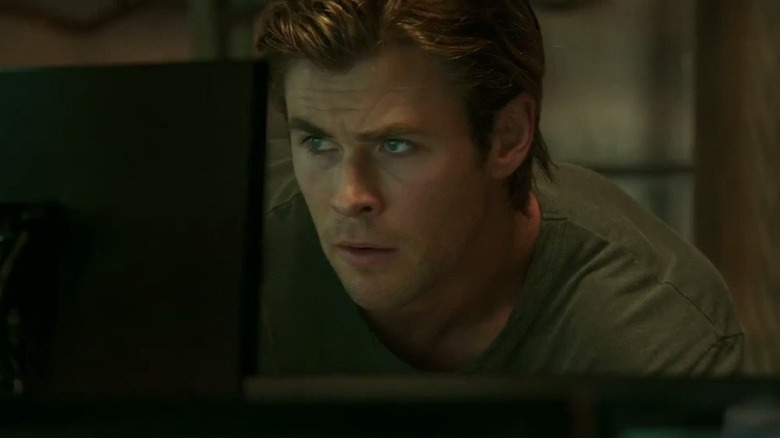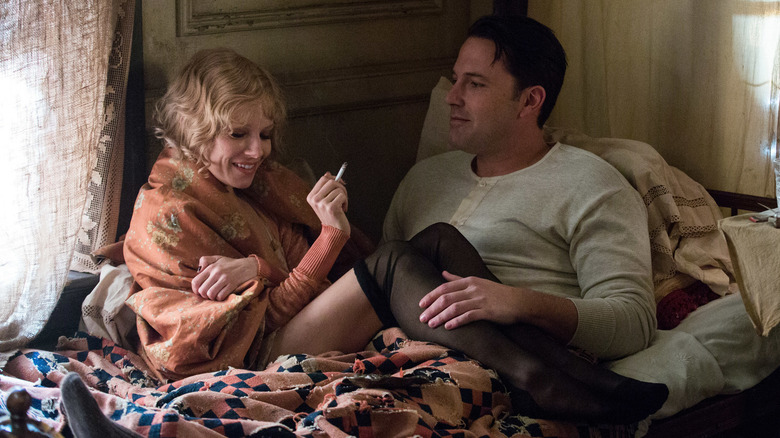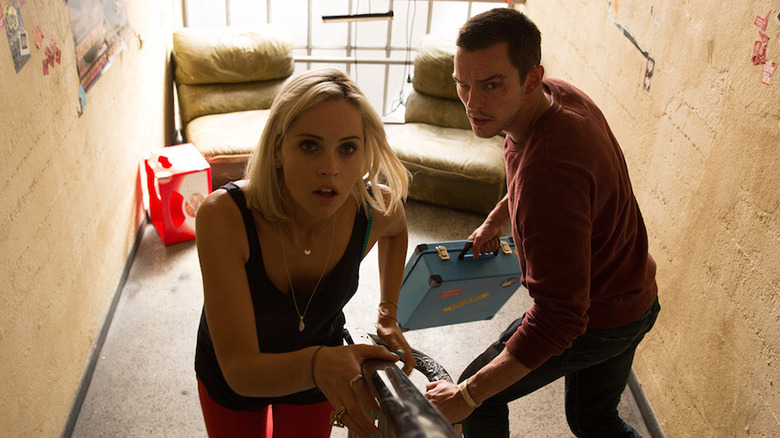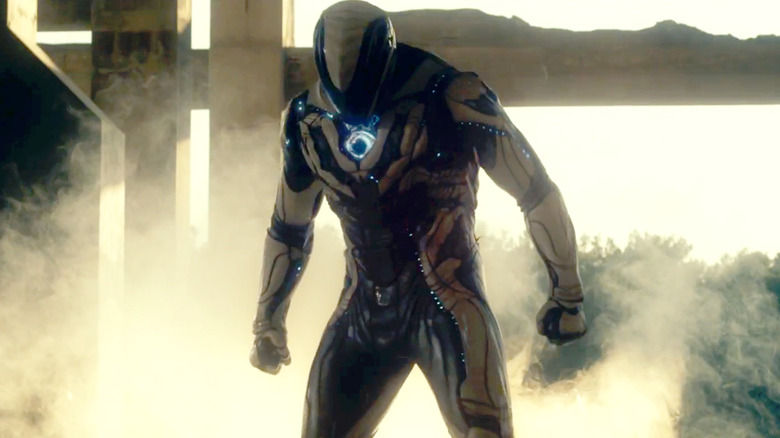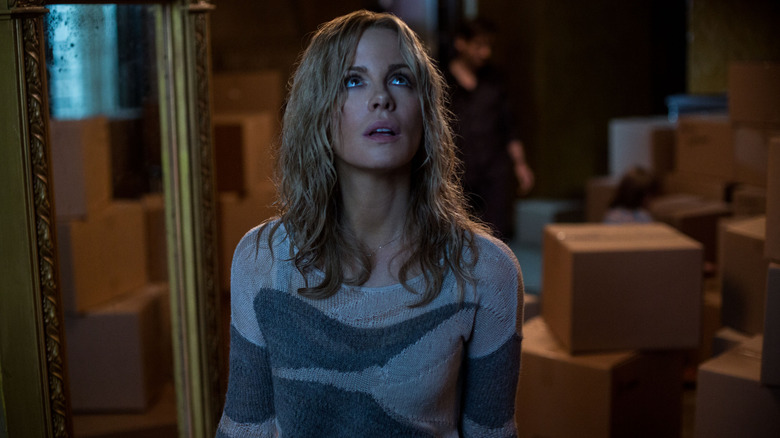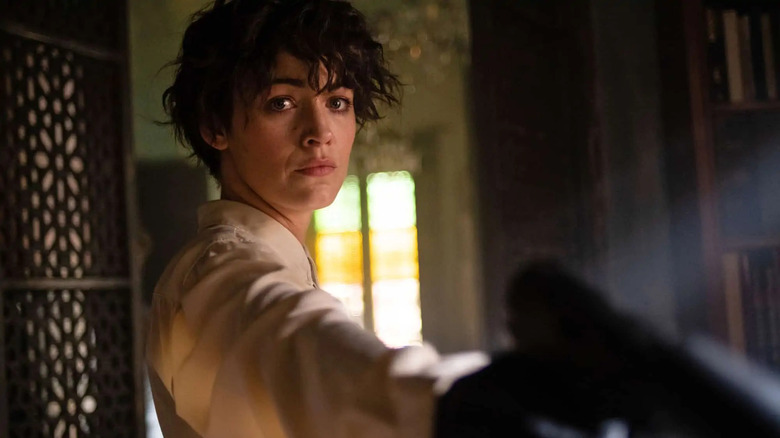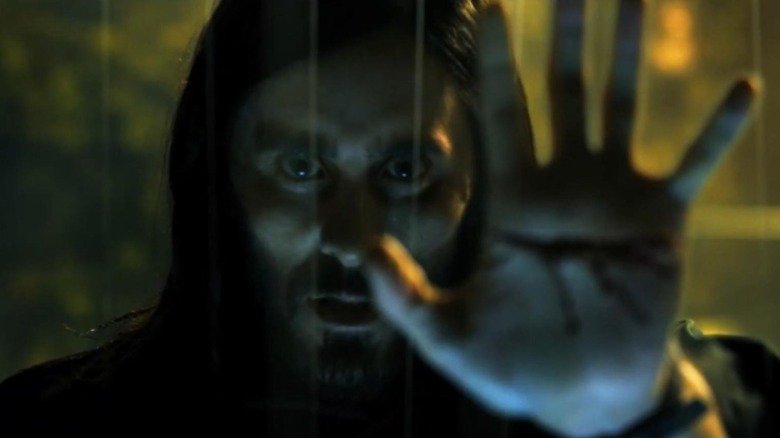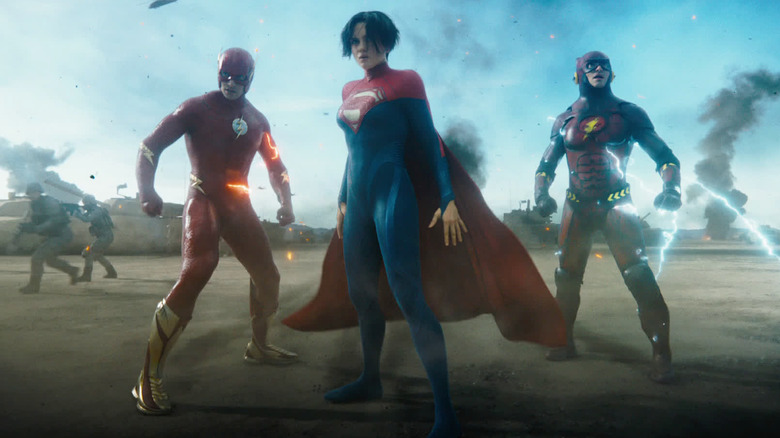Movies So Bad They Were Pulled From Theaters
Movies ultimately live forever, destined to be shelved on DVD, floating around on streaming services, or popping up on TV. Nevertheless, filmmakers and movie studios alike make movies for their first, biggest, and most important form of exhibition: the theater. Most movies debut at the multiplex, on a big screen with gigantic sophisticated speakers, washing over a crowd of customers in comfortable seats paying a small fortune for the privilege. Watching a film is a shared experience among strangers, and because it's still the best way to see a movie, it's here where a film can earn millions and millions for month after month.
Of course, that's only if the movie's a hit. If it's a bomb, that theater will stay relatively empty until the film fades from memory and theaters offer fewer and fewer showtimes over the following weeks. Even worse, audience apathy can sometimes turn to fury. A film might perform so poorly and become so poisoned by terrible word-of-mouth that studios or distributors will pull it out of theaters abruptly to end the embarrassment. Check out this round-up of box office disasters, because you probably didn't see them in theaters.
Jem
The whole reason Hollywood makes movies out of familiar properties is because name recognition equals free marketing. It's much easier to get filmgoers on board with something they already know (and like) than to sell them on a new concept. That's how and why "G.I. Joe" and "Transformers" became successful movie franchises. Ironically, another fondly remembered cartoon show and toy line from the '80s became one of the biggest film flops of all time.
"Jem and the Holograms," a live-action, modernized version of the Reagan-era property about an all-female glam/pop/rock band, opened huge in October 2015, to more than 2,400 theaters. But the movie was doomed. Filmmakers didn't stay true to the source material, thus putting off the only people who'd actually want to go see it. The result: an abysmal rating on Rotten Tomatoes and an opening weekend that earned $1.37 million, landing way down at 15th place. In week two, revenues dropped to a mere $388,000. And that's when Universal decided to pull it out of theaters completely and pretend it never even existed.
Gigli
Had "Gigli" it not starred two of the biggest celebrities of the era — engaged in a high-profile, tabloid-worthy relationship at the time — it would have been a weird and forgettable movie, not a legendary flop. Ben Affleck plays a stereotypical movie gangster goon with an unpronounceable name (Gigli, or rather "JEE-lee"), assigned by his crime lord bosses to kidnap the "Baywatch"-obsessed developmentally disabled brother (Justin Bartha) of a federal prosecutor. Things go awry, of course, so the bosses send in a more capable operative, Ricki (Jennifer Lopez). Oh, and they fall in love, even though Ricki is gay and Gigli is a raging misogynist.
That plot, and the off-screen Bennifer antics that overshadowed "Gigli," launched an unofficial competition among critics over who could say the meanest things in their reviews. The Wall Street Journal called it "the worst movie — all right, the worst allegedly major movie — of our admittedly young century," while the Washington Post said it was "torpid, slack, dreary, and, oh yes, nasty, brutish, and long." Somehow, this movie that consists mostly of Affleck and Lopez's characters talking in an apartment cost $54 million to make, and unsurprisingly bombed, bringing in just $6 million. After three weeks in theaters, Gigli moved on to its final resting place in grocery store DVD bargain bins.
The Oogieloves
Inspired by the interactive audiences of "The Rocky Horror Picture Show" and an animated audience at a showing of "Madea Goes to Jail," screenwriter Kenn Viselman conceived of a film where kids were encouraged to yell out thoughts to the characters on screen. "I just got that what we need to do is allow children to be children, allow them to behave the way they would behave. And so if we created a film that allowed for that, that actually embraced it and encouraged it, we would have an incredibly different experience," Viselman told The Hollywood Reporter.
The film's poster bizarrely proclaimed "The Oogieloves in the BIG Balloon Adventure" as a production from "the marketing visionary who brought you Teletubbies, Thomas the Tank Engine, and Eloise" (that would be Viselman). The movie itself was a pretty generic kids movie with some brightly-colored costumed characters named Goobie, Zoozie, Toofie, and Ruffy, with special appearances from stars kids love, like Cloris Leachman and Toni Braxton.
Parents had little interest in paying for their kid to a yell at a screen for 90 minutes when they could do that at home for free. During its first weekend, "The Oogieloves" earned $448,131 at 2,160 theaters. Accounting for multiple showings at each location, that works out to about two people per screening. It somehow did even worse in its next two weekends (where it played to 281 theaters and then just eight) before the marketing visionaries at Kenn Viselman Presents mercifully removed it.
United Passions
In June 2015, a movie with the generic and bland title of "United Passions" hit theaters, a mawkish story of the rise and greatness of FIFA, the worldwide governing body of soccer (or football, if you're not American). It's so extremely pro-FIFA that it's no surprise FIFA provided most of the film's $22 million budget. A bad movie for sure — it earned a rare zero percent rating on Rotten Tomatoes — but it also fell victim to extremely bad timing. Its release came just days after the arrests and indictments of more than a dozen FIFA executives on corruption charges and the resignation of FIFA president Sepp Blatter (played in "United Passions" by Tim Roth).
Director Frédéric Auburtin publicly regretted having made the film (which FIFA executives odiously wanted to title "Men of Legend") and called it "propaganda." While not released to theaters in soccer powerhouses like Germany, Brazil, or France, "United Passions" played to 10 theaters in the United States ... where it earned a grand total of $918. "United Passions" dispassionately dis-unified with theaters after just one week.
Delgo
In the late 2000s, a science-fiction allegory about respecting nature and the dangers of colonialism hit theaters. It utilized cutting-edge CGI and animation technology to render lifelike but exotic humanoid creatures. No, not "Avatar," which pulled in a record $2.7 billion at the worldwide box office and played to packed movie theaters for months on end across 2009 and 2010. No, this is the story of "Delgo," a movie at the other end of the box office and theatrical tenure spectrum. This 2008 animated feature bore a similar look and premise to "Avatar" — the protagonists flee their resource-ravaged homeland for another — but far from the same success.
Made by the small Fathom Studios, development began in 1999, when CGI animation was still something of a novelty. By the time of its release in 2008, "Delgo's" style was old hat (and not particularly well-executed), and its lead voice actors (Freddie Prinze, Jr. and Jennifer Love Hewitt) had lost their A-list status. While "Avatar" broke just about every box office record, "Delgo" broke one, too — it earned $511,000 at 2,160 theaters during its first weekend, bad enough to make it worst wide release weekend in movie history (at the time). It doesn't rank among the worst second weekends of all time, because Freestyle Releasing yanked "Delgo" out of theaters just seven days after release.
Swept Away
Madonna is certainly one of the greatest and most influential pop stars of all time, but that goodwill has very little to do with her forays into acting. She's basically the Meryl Streep of the Razzie Awards, who have dishonored Madonna a remarkable 16 times for stinkers like "Shanghai Surprise," "Body of Evidence," and "Swept Away."
The latter seemed like it might be a little better than the usual Madonna movie, as it was both written and directed by Guy Ritchie, the acclaimed filmmaker behind "Lock, Stock, and Two Smoking Barrels," who also happened to be Madonna's husband at the time. That didn't seem to do much good, however — the desert island rom-com (Madonna plays a socialite, Adriano Giannini plays a Communist, and they're stranded together) took home four Razzie Awards and a critical reaction to match. Christy Lemire of the Associated Press called it "a cinematic shipwreck," while Almar Hafildason of the BBC said "Swept Away" "really does deserve to sink without a trace." Audiences didn't like it either. It played in American theaters for three weekends (to a total of less than $600,000) before the distributor swept it away.
Silent Night, Deadly Night
Tim Burton's classic "The Nightmare Before Christmas" isn't the first film to combine scary Halloween stuff with the trappings of the Most Wonderful Time of the Year. In November 1984, Tristar Productions released "Silent Night, Deadly Night," a slasher movie in the traditional '80s style, except that the villain wasn't a guy in a hockey mask or a knife-outfitted glove — he was a crazed man named Billy (Robert Brian Wilson) who killed people with an axe while dressed as Santa Claus.
More than 200 picketers assembled at two theaters in Brooklyn, bearing signs that read "Santa's Not a Hitman" and "Deck the Halls with Holly, Not Bodies." That outcry prompted Tristar to cancel a big TV advertising push, and some theaters refused to book the movie at all, including United Artist Theaters, two chains in Montana, and a few houses in Cleveland. What would have been a much bigger release wound up a moderate one — "Silent Night, Deadly Night" ultimately played in about 400 theaters nationwide. The outrage killed the film's prospects like Santa killed his prey — it was pulled from theaters after two weeks.
Honky Tonk Freeway
Released in August 1981, "Honky Tonk Freeway" is a pleasant enough ensemble comedy that seems tailor-made to run on a low-wattage local TV station on a Sunday afternoon. It's about a small Florida tourist trap of a town called Ticlaw that's home to a small zoo and a water-skiing elephant. The mayor (William Devane) bribes a state official to ensure that a new freeway will include an off-ramp into Ticlaw, thus vastly improving the town's fortunes. The off-ramp doesn't get built, so the residents come together to paint the whole town pink as a publicity stunt. All of that non-action is intercut with the stories of various individuals about to wind up in Ticlaw, including bank robbers, hitchhikers, a family, and some nuns.
Directed by Academy Award-winner John Schlesinger ("Midnight Cowboy"), this whole affair somehow cost $24 million, six million more than its far more visually impressive contemporary "The Empire Strikes Back." Total box office haul of "Honky Tonk Freeway": just over $2 million. The film was gone from theaters without a trace within a few weeks.
Postal
There are only a few "name" directors known (and often beloved) for making bad movies, and alongside legends like Roger Corman and Ed Wood sits Uwe Boll. In the 2000s, Boll carved a niche in the film industry as the go-to guy to turn video games into movies. Even when he lucked into working with great actors, the results remained unimpressive. Efforts like "BloodRayne" and "Alone in the Dark" contributed heavily to the universally-acknowledged notion that video game movies are always terrible.
But the one that rises above (or sinks below) the rest is "Postal." Boll's 2007 film took the kill-'em-all action of the "Postal" games and added a plot where Zack Ward (best known as Scut Farkus from "A Christmas Story") plays the titular (and extremely violent) Postal Dude. The film includes dozens of gruesome deaths, Boll playing himself getting shot in the groin, and a comic scene featuring two of the 9/11 hijackers.
While that seems like the plot of a direct-to-video movie, "Postal" got itself a wide theatrical release, scheduled for May 2008 (opposite "Indiana Jones and the Kingdom of the Crystal Skull"). But just before its release, nearly all of the distributors that had lined up pulled out. Rather than open on 1,500 screens, it opened on four. That's right — "Postal" was so bad that it got pulled out of theaters before it even arrived.
It's Pat
There have been many movies inspired by characters or sketches from "Saturday Night Live," some of which have been very critically and commercially successful, like "Wayne's World" or "The Blues Brothers." However, many of them have been box office disappointments, with one of the more infamous examples being 1994's "It's Pat," centered on Julia Sweeney's androgynous character from her early-'90s tenure on the sketch show.
"It's Pat" follows the titular character's romantic relationship with the similarly-genderless Chris, played by Dave Foley, while their neighbor Kyle, played by Charles Rocket, resolves to figure out the character's gender once and for all. As one can expect, the comedy of the character's sketch iterations didn't translate well to the big screen, as Variety wrote that it "relies heavily on verbal and visual gags that run the gamut from the painfully obvious to the grossly crude." As of May 2024, the film has a rare 0% rating on Rotten Tomatoes.
Fortunately, the film didn't have much of a presence theatrically to be pulled from in the first place. "It's Pat" only opened in 33 theaters across the country, raking in $60,822 during its opening weekend before being dropped. Sweeney, for her part, even seems troubled by her history of playing the character, appearing as herself on Showtime's "Work in Progress" grappling with the consequences of playing a problematic character.
From Justin to Kelly
Winning "American Idol" during its first season in 2002 was a career-maker for Kelly Clarkson, who went on to become not just a successful pop artist with hits like "Since U Been Gone" and "Stronger (What Doesn't Kill You)," but also a daytime talk show host. However, that career trajectory wasn't without its bumps, as indicated by the existence of "From Justin to Kelly," a musical rom-com in which she co-stars alongside "American Idol" runner-up Justin Guarini, fictionalizing their meeting at spring break in Fort Lauderdale.
Clarkson was opposed to starring in the movie and knew from the get-go that it wasn't going to work, telling US Weekly, "I cried for a solid hour on the phone with the creator of 'American Idol' and pleaded to be let out of the contract that said I had to film 'From Justin to Kelly'." It seems Clarkson's instincts were right, as the film only grossed $2.7 million on its opening weekend against a budget of $14 million, and lasted just two weekends before nearly 2,000 theaters pulled it from their rotation.
Critics weren't exactly positive about the film when it was released in 2003, just as Clarkson had expected. As Time Magazine wrote about the film, "In the most generous light[, it] is the worst film so far this century." At least Kelly Clarkson's embarrassing breakout role didn't have a long theatrical run.
Seeking Justice
Nicolas Cage is no stranger to starring in films that are poorly received, with the most noteworthy examples being films like "The Wicker Man" and "Ghost Rider." However, the 2011 action flick "Seeking Justice" is one of the lesser-known Cage films, likely due to its bombing at the box office, grossing just under $250,000 in its opening weekend and getting pulled from theaters within three weeks.
One look at the plot summary of "Seeking Justice," and it's pretty obvious why audiences weren't exactly gunning to see it in theaters. Cage plays Will, an English teacher whose wife (January Jones) is brutally assaulted one night, resulting in Will enlisting a secret service to hunt down his wife's attacker.
In his one-and-a-half-star review, Roger Ebert's only commendation for the film was to praise Cage's acting, but the rest of the movie "is constructed of ... preposterous scenes," pointing to the confusing logic of how this secret organization exactly works. While "Seeking Justice" may not be Nicolas Cage's most outlandish role ever, its short-lived tenure in the theaters made it one of his most forgettable.
Paranoia
Director Robert Luketic has pumped out some hits at the theater, with his most notable projects including the 2001 comedy "Legally Blonde" and the heist flick "21." However, his 2013 thriller "Paranoia" wasn't his most inspired project, according to critics. The film's all-star cast includes Gary Oldman, Amber Heard, Harrison Ford, and Richard Dreyfuss, as well as Liam Hemsworth in one of his first starring roles as Adam, a corporate inventor-turned-spy.
Unfortunately, Hemsworth (and the rest of the movie) drew ire from critics, with The New York Times writing of his performance, "he ambles through the role like an obedient robot," and likening the film's direction to "a deluxe perfume commercial." However, Variety expected more from its theatrical results, writing, "Indifferently made and nearly tension-free, this Liam Hemsworth starrer should generate moderate opening weekend B.O.; after that, it would be well advised to look over its shoulder." The filmmakers would've probably killed for a moderate opening weekend compared to what it got.
Against its whopping $35 million budget, "Paranoia" only grossed $3 million in its first weekend, before getting pulled from over 2,000 theaters after its second. "Paranoia" ended its theatrical run with a box office gross of $15 million worldwide, still under half of its budget, making it one of the biggest box-office bombs of 2013.
Mortdecai
David Koepp is one of the most successful screenwriters of all time, having penned films like "Indiana Jones and the Kingdom of the Crystal Skull," Sam Raimi's first "Spider-Man," and the first "Mission: Impossible" movie. However, his stints behind the camera have been less successful, with the most infamous example being "Mortdecai," starring Johnny Depp as a corrupt art dealer in extreme debt who turns to theft, putting him in the crosshairs of law enforcement.
In a review for The Hollywood Reporter, "Mortdecai" was described as "stuffed with star names and classic farce ingredients, but its fatal flaw is an almost surreal lack of jokes," and "ultimately a frightful, crashing bore." Its opening weekend gross of $4 million might not sound like much of a failure until you discover the film had an astronomical $60 million budget, and ultimately made back less than $50 million in its worldwide theatrical run.
Its domestic theatrical run, at the very least, didn't last long. "Mortdecai" was pulled from 2,000 theaters after its second weekend, and had disappeared from all others by President's Day weekend of 2015. Suffice it to say, it was a rough way to start the year.
Blackhat
It's rare to call a Michael Mann film a failure, especially when the director's repertoire includes iconic films like "Heat," one of the best crime movies of all time, and most recently, the Adam Driver-led "Ferrari." However, his 2015 thriller "Blackhat" was one of the year's biggest box office disasters, only making $19 million throughout its entire theatrical run against a budget of $70 million. It was even dropped from nearly 2,500 theaters after its second weekend, remaining in theaters for just three weekends in total, which was curious considering the film had divisive reviews.
The Los Angeles Times, for one, praised Mann's direction, though questioned the casting of Chris Hemsworth as a hacker recruited by the FBI to assist in the capture of a cyberterrorist, saying, "the sullen cast he gives to the role testifies to his lack of comfort as much as anything else." Other reviewers felt it would be unmemorable in comparison with the rest of Mann's career, though Mann felt the film's failure was due to a lack of preparation.
While some critics liked "Blackhat" enough to put it on their year-end lists, its failure at the box office was ultimately blamed on poor marketing strategy, as well as box office competition with "American Sniper." Its negative reception also led to its Australian theatrical release being canceled by Legendary Pictures, which was probably a blessing in disguise for Hemsworth.
Live By Night
Ben Affleck has been a part of some hugely successful films, both in front of and behind the camera. His directorial filmography includes "The Town" and "Argo," the latter of which won the best picture Oscar. However, Affleck has also been responsible for the occasional box office dud, which was the case with the 2016 crime movie "Live by Night," which he directed, wrote, and starred in as Joe Coughlin, a bootlegger-turned-gangster in mid-1920s New York City, with co-stars including Elle Fanning, Sienna Miller, and Brendan Gleeson.
After a limited release in December 2016 that made a dismal $33,336, "Live By Night" made its wide theatrical debut in January 2017, and was dropped from over 2,600 theaters by the end of its third weekend. It ultimately ended its theatrical run weeks later with only $22.7 million gross against a budget of $90 million, resulting in Warner Bros. losing upwards of $75 million as a result.
The film's reviews, for the most part, found it a disappointment compared to Affleck's other work. Variety wrote that "Live By Night" feels like, "the ghost of a terrific movie: All the pieces are in place, yet as you're watching it ... there doesn't seem to be quite enough [there.]" It's a shame that a cast this stacked was assembled for an ultimately forgettable experience.
Collide
Every so often, films perform so well at the box office that they set new records, but it's rare that a film sets a record in the opposite direction. That's what happened with the 2016 action film "Collide," which had the second largest second-weekend drop in box office history, getting pulled from 1,000 theaters between its first and second weekend, and then dropped from theaters entirely. By the end of its short-lived theatrical run, "Collide" only grossed $6.8 million, with a reported budget of $29 million.
The film nearly avoided a release altogether when its distributor, Relativity Media, filed for bankruptcy in 2015. Its original distributor, IM Global, repurchased the distribution rights, later handing off duties for the theatrical release to Open Road Films. In the end, it didn't even matter, because no one saw the movie anyway.
The film stars Nicholas Hoult as a money runner who agrees to a high-stakes drug theft to secure funds for his girlfriend's kidney transplant, with a supporting cast including Felicity Jones, Ben Kingsley, and Anthony Hopkins. The A.V. Club wrote a review of the film, calling it "unexceptional, a hodgepodge of corny voice-over and repetitive, anticlimactic plotting."
Max Steel
If you want to watch an incredible movie based on Mattel toys that performed well at the box office, thankfully you have better options than "Max Steel." The action-figure franchise received many adaptations for film and TV, but it was its live-action foray into movie theaters that seemed to doom the potential of Mattel's film. Released in 2016, the film centers on Max, a teenager who fuses with an alien named Steel to become a superhero known as — you guessed it — Max Steel.
Like "It's Pat," "Max Steel" is one of the few films on Rotten Tomatoes with a 0%, with IGN calling it, "undoubtedly one of the most unfocused and lifeless films to appear on the silver screen [in 2016]." Other criticisms questioned the filmmakers' intentions behind making a poorly-conceived superhero film during a time of the genre's over-saturation in cinema amidst Marvel and DC domination. It makes sense why the company later approached 2023's "Barbie" with a little more care and reverence towards their own IP.
Unsurprisingly, "Max Steel" wasn't an attention-grabber with movie audiences, grossing only $6 million at the box office against a budget of $10 million, and it was dropped from almost 2,000 theaters after only its second weekend. Not a lot of people remember seeing it in theaters, but in this case, that might be a good thing.
The Disappointments Room
Relativity Media's bankruptcy didn't just affect "Collide" — "The Disappointments Room" was also a future box office bomb caught in the crossfire. Its distribution was eventually picked up by Rogue Pictures, who released the film in September 2016, only for the film to plummet at the box office. Despite having a budget of only $15 million, the film's entire theatrical run only grossed $5.7 million worldwide before leaving theaters, with over 1,500 theaters pulling it by the end of its second weekend.
Theatergoers didn't seem to miss much, admittedly. Led by Kate Beckinsale and Mel Raido, the film centers on a family that moves into a house with a mysterious, locked room that forces them to confront terrifying visions of their past. This is another movie that earned a 0% rating on Rotten Tomatoes, though reading the reviews will illuminate why "The Disappointments Room" was such a, well, disappointment.
For what it's worth, Variety commended the efforts of Beckinsale in the lead role as a woman descending into psychosis, as well as the work of the cinematographer and director, though of the rest of the film they were less enthused by, writing, "Somewhere around the two-thirds mark, however, the movie skids off the rails as the storyline becomes at once less mysterious and more illogical."
The Rhythm Section
Films released in January tend to have a bad go of it at the box office, but "The Rhythm Section" underperformed even with relatively low expectations. The action thriller paired Reed Morano, who has helmed Emmy-winning episodes of "The Handmaid's Tale" and indie films like "Meadowland" and "I Think We're Alone Now," with Blake Lively in one of the actress' most daring roles, though the end result didn't exactly pay off.
"The Rhythm Section" finds Lively playing a woman whose life derails after her family dies in a plane crash, resulting in her seizing an opportunity to seek revenge against the terrorists responsible by assuming the identity of a missing assassin. Some publications, at the very least, praised Lively and the character's potential, but attributed the film's failure to a lack of interest in original IP, particularly in female-led action films. In their 3-star review, The Guardian deemed the film "destined to be viewed on a million long-haul flights."
Despite having more praise thrown towards it than other films on this list, "The Rhythm Section" fascinatingly set a record for the biggest theater drops in box office history, starting its first two weekends with over 3,000 theaters and getting pulled from all but 94 on its third weekend. Its worldwide box office gross totaled about $6 million next to its $50 million budget.
Morbius
It's quite a sight when a critically-panned movie takes on a life of its own outside the movie theater, but such is the rare case for Dr. Michael Morbius, a D-tier "Spider-Man" villain played by Jared Leto who was given a movie of his own in 2022 called "Morbius." The film, initially released in April 2022, flopped both critically and commercially, with Collider writing that it "prioritizes action over substance, doing little to establish character arcs, dynamics, and backstories in favor of focusing on action sequences, fights, and flashy CGI."
For most films, especially some on this list, a disappointing box office performance and scathing reviews would be enough to let it be forgotten. However, the internet didn't let that happen, as the "Morbius" movie ended up gathering a cult following online through memes incorrectly deeming it the most financially successful movie of all time. In typical corporate fashion, Sony misinterpreted these jokes and decided to re-release the film in June 2022 to capitalize on its online "appreciation."
As one could expect, the film's re-release didn't go according to plan, grossing only $310,000 (compared to its opening weekend numbers of $39 million). After just one weekend of its re-release, nearly 1,000 theaters pulled it from its rotation for good, while the rest finally stopped showing "Morbius" after three more weeks. Maybe it'll make a re-appearance sometime as a cult film at late-night theater showings like "The Room" or 2019's "Cats."
The Flash
It's no secret that Warner Bros. has struggled to capture the magic of the Marvel Cinematic Universe with their superhero adaptations, from "Zack Snyder's Justice League" to "Black Adam." 2023's "The Flash" might be their biggest failure in that department, as the film's release was marred by controversy surrounding its star, Ezra Miller, who played not one but two iterations of Barry Allen, a.k.a. The Flash, in the movie. As a result, WB targeted the marketing towards its supporting cast, including Sasha Calle's Supergirl and Michael Keaton's reprisal of Bruce Wayne.
Unfortunately, the film had more than Ezra Miller to worry about, as reviews and online discourse surrounding it were scathing and ominous towards the future of the superhero film genre. Vulture's review was particularly dismal, claiming "[it's] all a gaudy retread: Sell audiences the pain and joy they've already experienced, ignore the present, dim the future." There was also criticism reserved for the embarrassing CGI moments in "The Flash," including digitally resurrecting deceased actors like Christopher Reeve, Adam West, and George Reeves.
The film predictably bombed at the box office, grossing $271 million at the end of its theatrical run against a budget of $220 million. Despite opening in over 4,000 theaters, nearly 2,000 dropped the movie after two weekends. After Fourth of July weekend, "The Flash" disappeared from even more theaters. Hopefully, James Gunn's takeover of the DC Cinematic Universe will prove fruitful for the studio's future projects.
